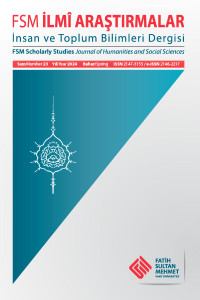Öz
This study researches the relationship between the political culture and the political
regime in Türkiye. In this context, the characteristics of the political culture in Türkiye
and its transformation, the lines of continuity and change there, and the relationship
between these lines and the political regime are researched. It is argued that the political
regime defining the relationships of sovereignty is decisive in the characteristics of the
political culture and its continuity and change in Türkiye. It is put forward that the lines
of change become more evident in the characteristics of the political culture, depending
on the transformation in the political regime. In this context, it is argued that, until the
2010s, the political culture in Türkiye has been characterized by the parliamentary regime
and bureaucracy. As of the end of 2010s, it has a characteristic in the context of the
presidential regime and social groups. In this characteristic, it is revealed that the political
competition environment, which is not sufficiently balanced institutionally, reinforces
the understanding of leader-centered politics in the Turkish political culture and also
produces a phenomenon of “political community” in terms of representation processes
between society and politics in the Turkish political culture.
Anahtar Kelimeler
Sovereignty political regime political culture transcendental state identity politics
Kaynakça
- Abou El-Haj, Rıfat Ali, “The Ottoman Vezir and Paşa Households 1683-1703: A Preliminary Report”, Journal of the American Oriental Society, Vol 94, No 4, 1974. _________, Modern Devletin Doğası: 16. Yüzyıldan 18. Yüzyıla Osmanlı İmparatorluğu, çev. Oktay Özel - Canay Şahin, Ankara, İmge Kitabevi, 2000.
Öz
Bu çalışmada Türkiye’de siyasal rejim ve siyasal kültür arasındaki ilişki ele
alınmaktadır. Bu kapsamda siyasal kültürün karakteri, dönüşümü, oradaki süreklilik
ve değişim hatları; bu süreklilik – değişim hatları ile kurulu siyasal rejim arasındaki
ilişki incelenmektedir. Çalışmada Türkiye’de siyasal kültürün biçimlenişinde, özellikle
egemenlik ilişkilerini tanımlayan kurulu siyaset rejiminin belirleyici olduğu tezi öne
sürülmektedir. Siyaset rejimindeki dönüşüme bağlı olarak, siyasal kültürün karakteristik
özelliklerinde de değişim hatlarının belirginleştiği iddia edilmektedir. Bu kapsamda
dönemsel olarak Türkiye’de 2010’lara kadar aşkın devlet geleneği temelinde bir siyasal
kültürün biçimlendiği öne sürülmektedir. 2010 sonları itibariyle ise kimlik siyaseti
temelli bir siyasal kültürün geliştiği iddia edilmektedir. Bu yeni karakteristik kapsamında
kurumsal olarak yeterince dengelenmemiş siyasal rekabet ortamının, Türkiye siyaset
kültürü içerisinde bir yandan lider merkezli siyaset anlayışını pekiştirdiği; öbür yandan
toplum ve siyaset arasındaki temsil süreçleri açısından bir “siyasal cemaatleşme” olgusu
ürettiği ortaya konmaktadır.
Anahtar Kelimeler
Egemenlik siyasal rejim siyasal kültür aşkın devlet kimlik siyaseti
Kaynakça
- Abou El-Haj, Rıfat Ali, “The Ottoman Vezir and Paşa Households 1683-1703: A Preliminary Report”, Journal of the American Oriental Society, Vol 94, No 4, 1974. _________, Modern Devletin Doğası: 16. Yüzyıldan 18. Yüzyıla Osmanlı İmparatorluğu, çev. Oktay Özel - Canay Şahin, Ankara, İmge Kitabevi, 2000.
Ayrıntılar
| Birincil Dil | Türkçe |
|---|---|
| Konular | Tarihsel Çalışmalar (Diğer) |
| Bölüm | Araştırmalar ve İncelemeler |
| Yazarlar | |
| Yayımlanma Tarihi | 12 Haziran 2024 |
| Kabul Tarihi | 15 Nisan 2024 |
| Yayımlandığı Sayı | Yıl 2024 Sayı: 23 |


